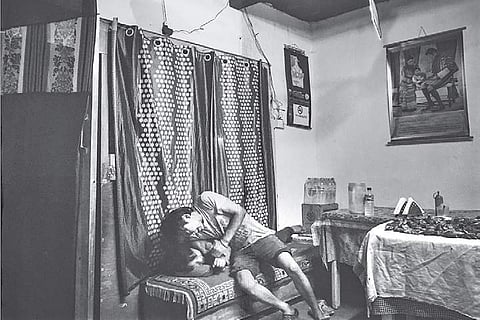

The mind is a labyrinth, much like the night. And in an attempt to dig deep into depths of this space is Abhishek Basu with his 60 photographs.
These largely black and white photographs disclose the quietude, poetry, love, intimacy, loneliness and stillness he has been through and has seen in his journey of self.
His ongoing solo show Lucid amalgamates two series of works, Labyrinth and The Rum Diary.
Basu, 29, has no formal education in photography. The mass communication graduate from Tatanagar, Jamshedpur, always wanted to be a storyteller, and had his first brush with photography at age five when his father gifted him a KB 10 camera.
“With pictures, I tend to draw a storyline, a kind of a narrative to tell people what’s the feel behind the works,” says the photographer, whose book titled The Rum Diary that will be a detailed version of these series will be out shortly.
“It’s a trilogy of my romantic relationships during three seasons. Elite Seas is about snow, Petrichor is about monsoon, and Passion Fruit is about summer and the beaches.”
Labyrinth has around 30 images chosen from a huge body of work shot at night in Delhi over a period of time.
And The Rum Diary is more of a scrapbook. “It’s a personal take on the contemporary world, my understanding of people around me and my romantic relationships. These images have mostly been shot in Pondicherry and Puerto Rico, where I got a chance to get mentored by the famous photographer David Alan Harvey.”
Sharing an incident that led to his first image for Labyrinth, he says, “It was 4:00 am, and I was walking on the road close to Qutub Minar. I found two drunken African women fighting.
"The image is hazy [featured above] because I got pushed around while capturing the image. In the meantime, police came and suspecting something fishy [given the nature of their clothes] they took us all to the police station. And while the women were going out of control and started abusing each other again, I took this shot.”
Basu feels photographs cannot replace memories, “yet we need to store and hang onto them because there is an emotional bond between the two”. With this thought, he plans to keep on capturing images, one memory at a time.